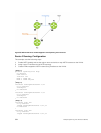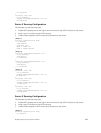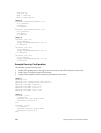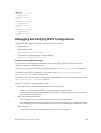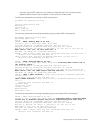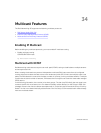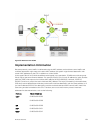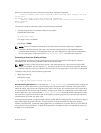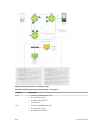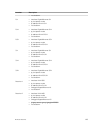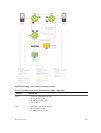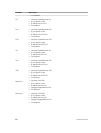
Protocol Ethernet Address
PIM-SM 01:00:5e:00:00:0d
• The Dell Networking OS implementation of MTRACE is in accordance with IETF draft draft-fenner-
traceroute-ipm.
• Multicast is not supported on secondary IP addresses.
• Egress L3 ACL is not applied to multicast data traffic if you enable multicast routing.
First Packet Forwarding for Lossless Multicast
All initial multicast packets are forwarded to receivers to achieve lossless multicast.
When the Dell Networking system is the RP, and has receivers for a group G, it forwards all initial
multicast packets for the group based on the (*,G) entry rather than discarding them until the (S,G) entry
is created, making Dell Networking systems suitable for applications sensitive to multicast packet loss.
NOTE: When a source begins sending traffic, the Source DR forwards the initial packets to the RP as
encapsulated registered packets. These packets are forwarded via the soft path at a maximum rate
of 70 packets/second. Incoming packets beyond this rate are dropped.
Multicast Policies
The Dell Networking OS supports multicast features for IPv4. IPv6 multicast is not supported.
• IPv4 Multicast Policies
IPv4 Multicast Policies
The following sections describe IPv4 multicast policies.
• Limiting the Number of Multicast Routes
• Preventing a Host from Joining a Group
• Rate Limiting IGMP Join Requests
• Preventing a PIM Router from Forming an Adjacency
• Preventing a Source from Registering with the RP
• Preventing a PIM Router from Processing a Join
Limiting the Number of Multicast Routes
When the total number of multicast routes on a system limit is reached, the system does not process any
IGMP or multicast listener discovery protocol (MLD) joins to PIM — though it still processes leave
messages — until the number of entries decreases below 95% of the limit.
When the limit falls below 95% after hitting the maximum, the system begins relearning route entries
through IGMP, MLD, and MSDP.
• If the limit is increased after it is reached, join subsequent join requests are accepted. In this case,
increase the limit by at least 10% for IGMP and MLD to resume.
• If the limit is decreased after it is reached, the system does not clear the existing sessions. Entries are
cleared after a timeout (you may also clear entries using clear ip mroute).
NOTE: The system waits at least 30 seconds between stopping and starting IGMP join processing.
You may experience this delay when manipulating the limit after it is reached.
612
Multicast Features



